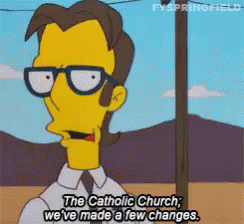So this is it, our last blog. Honestly, it’s kind of bittersweet. On one hand we’re almost done with our first year of college (woo!!), but on the other we still have to write one last paper, which is much longer than the others we’ve written this semester (not so woo).
Back to the blog, while I was skimming White and Hanson I realized I wanted to explore Chapter 7: Religion and the American Dream: A Catholic Reflection in a Generational Context. As a person who grew up Catholic and attended Catholic school for 14 years, it seemed interesting to me.
Written by William V. D’ Antonio, this chapter discusses how Catholics from different generations view the American Dream. The two generations in question are the “Greatest Generation” (grew up during the Great Depression and World War II) and the Millenial Generation (lived during 9/11 and experienced its consequences; experienced the ongoing wars). The Millennial Generation is pretty much the grandchildren of the Greatest Generation. I know most of us were born in 1998 or 1999 and know about 9/11 and know about all the wars so I consider us part of the Millennial Generation (but I can be wrong). I also consider myself part of this generation just because my grandpa lived through WW2, but then again I could be wrong.
Although he talks about the differences between the two generations, the claim I thought was most interesting was about social justice in a Catholic perspective and the American Dream. For those who are not Catholic, the Catholic Church has social teachings that are taught pretty much as soon as you can read and write. They are based on the concept of performing actions that would benefit the greater good. These teachings were then discussed further curing the Second Vatican Council (1962-1965). With these two texts, D’Antonio claims that “during the 20th century Catholic Church teachings evolved from a focus on personal salvation…and then communication with obedience to a complex and extended set of rules that guaranteed salvation” (134). With this, he is saying that Catholics, over the years, have become less concerned with their own salvation and more concerned with the well-being of those around them. However, he takes this further by saying that “many Catholics believe the government has a moral responsibility to act at all levels, including the national, to see that the needs of the people will be met” (134). He explains that Catholics believe that all social classes need to ensure that everyone’s needs are met.
As a Catholic Millennial, I can see how this is true. I grew up doing community service, making dinners for the homeless, and raising money to donate to a charity cause every year during Lent. And as I got older, I became more invested in taking care of those less fortunate (which is why I’m a nursing major) and taking care of the planet. I became very interested in social justice, especially after I had to take a whole class dedicated to it in junior year. I have seen the world change, for the better and the worst, and because of how I grew up, I have a bias for taking care of those around me.
I found it interesting though that D’Antonio questioned whether “young Catholics are able to look beyond their own threatened well-being to the needs of the common good in the face of so much uncertainty” (135-136). This made me question whether I’d be able to put others’ needs before my own when I get older. I also wonder whether the teachings of the Pope will influence this generation’s beliefs. Will the upcoming Pope be as focused on social justice as Pope Francis? How will it affect the whole church and the American Dream? Will future generations want to help others achieve their American Dream or only their own?

The Catholic ideal for living, which involves helping others for the greater good, may serve to be the new American Dream in a sense. In a world where materialism is no longer an option for people to look to as a reason for existence, altruism may be the next new thing. Your idea of helping others achieve the American Dream may not be entirely possible, since the American Dream does seem to be dead to a lot of people, but the idea of helping others might be. The world could always use more people doing community service and whatnot and helping people out in other ways.
LikeLike
I thought that this blog was pretty interesting, since I am not writing about religion and the American Dream, and I am not Catholic. It’s always cool to learn something from another person’s perspective! I think that Catholics becoming more involved in other’s well-being over the years rather than their own personal salvation is a good thing, don’t you think? Also, I liked how you incorporated your nursing major and said that you picked it because of your Catholic upbringing that consisted of helping others. All in all, I think that your questions about the future are valid and bring up good points. Great blog!
LikeLike
I’m going to have to respectfully disagree with the whole bittersweet comment I’m personally glad it’s over but besides the point. I for sure consider us millennials and I can see how our generation has become more and more concerned with bettering ourselves as opposed to choosing to act for the greater good. This authors points seem interesting and valid that while the church teaches selflessness and working for a common good the government should have some sort of responsibility or even care for the well being of its people. Having so much uncertainty in our future due to so many factors seems to leave a lot of room for us millennials to act irresponsibly and only care for ourselves.
LikeLike
Your perspective lends itself to some interesting lines of research here, Kaelin.
LikeLike